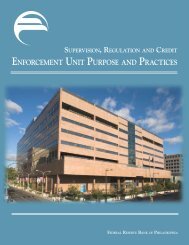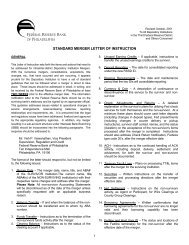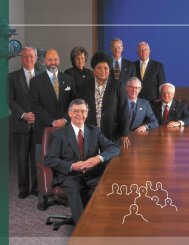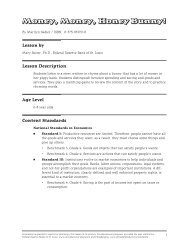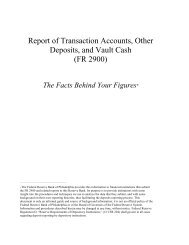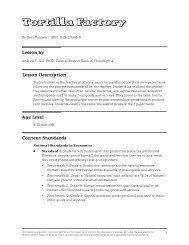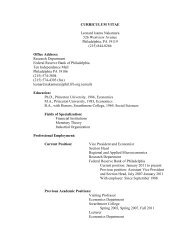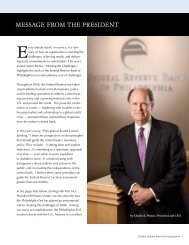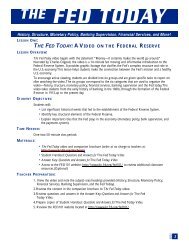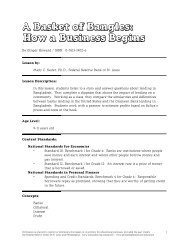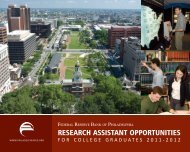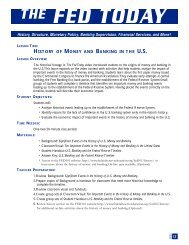The First Bank of the United States - Federal Reserve Bank of ...
The First Bank of the United States - Federal Reserve Bank of ...
The First Bank of the United States - Federal Reserve Bank of ...
Create successful ePaper yourself
Turn your PDF publications into a flip-book with our unique Google optimized e-Paper software.
GLOSSARY<br />
ARTICLES OF CONFEDERATION<br />
Provided <strong>the</strong> 13 colonies with a system <strong>of</strong> government<br />
from 1777 until replaced by <strong>the</strong> U.S. Constitution in<br />
1789. Among o<strong>the</strong>r things, <strong>the</strong> articles gave Congress<br />
<strong>the</strong> authority to make war and conduct foreign affairs.<br />
However, under <strong>the</strong> articles, Congress could not<br />
impose taxes or enforce laws.<br />
BANKNOTE<br />
A negotiable instrument; a promissory note (promise to<br />
pay) that is used as money.<br />
CENTRAL BANK<br />
A governmental institution responsible for issuing<br />
currency and monetary policy, which involves <strong>the</strong><br />
overall growth <strong>of</strong> money and credit and <strong>the</strong> level <strong>of</strong><br />
short-term interest rates. <strong>The</strong> <strong>Federal</strong> <strong>Reserve</strong> is now<br />
<strong>the</strong> central bank <strong>of</strong> <strong>the</strong> <strong>United</strong> <strong>States</strong>.<br />
CONTINENTAL CURRENCY<br />
<strong>The</strong> currency authorized by <strong>the</strong> Continental Congress<br />
to help finance <strong>the</strong> Revolutionary War. Continental<br />
currency was not redeemable for gold or silver.<br />
CREDIT CRUNCH<br />
A situation in which banks become unwilling or unable<br />
to supply additional credit.<br />
CUSTOMS DUTIES<br />
A form <strong>of</strong> tax levied on goods traded internationally.<br />
FEDERALIST PARTY<br />
Generally advocated a strong central government.<br />
<strong>Federal</strong>ists were <strong>of</strong>ten accused <strong>of</strong> being elitist or acting<br />
in favor <strong>of</strong> <strong>the</strong> wealthy.<br />
FINANCIAL BUBBLE<br />
A market condition created by excessive buying <strong>of</strong><br />
assets and a resulting run-up in prices.<br />
FINANCIAL CONTAGION<br />
When problems at one financial institution spill<br />
over to o<strong>the</strong>rs and cause problems at o<strong>the</strong>r financial<br />
institutions or businesses.<br />
FISCAL AGENT<br />
An organization that handles finances for ano<strong>the</strong>r<br />
organization. <strong>The</strong> <strong>First</strong> <strong>Bank</strong> acted as <strong>the</strong> government’s<br />
fiscal agent. Today <strong>the</strong> <strong>Federal</strong> <strong>Reserve</strong> fills <strong>the</strong> role <strong>of</strong><br />
fiscal agent for <strong>the</strong> U.S. government.<br />
INFLATION<br />
A rise in <strong>the</strong> general level <strong>of</strong> prices over a sustained<br />
period <strong>of</strong> time.<br />
INITIAL PUBLIC OFFERING (IPO)<br />
A company issues common stock or shares to <strong>the</strong><br />
public for <strong>the</strong> first time.<br />
MONETARY POLICY<br />
A central bank’s actions to influence <strong>the</strong> availability<br />
and cost <strong>of</strong> money and credit in <strong>the</strong> economy, as a<br />
means to promote national economic goals.<br />
PUBLIC DEBT<br />
Money (or credit) owed by <strong>the</strong> government — federal,<br />
state, or local. <strong>The</strong> government accumulates debt<br />
over time by running a deficit; it spends more than<br />
it receives in tax revenue. Governments borrow by<br />
issuing securities such as government bonds.<br />
REPUBLICAN PARTY<br />
In early U.S. history, opposed strong central<br />
government; generally wanted to keep <strong>the</strong> U.S. a nation<br />
<strong>of</strong> farmers. Originally called <strong>the</strong> Anti-<strong>Federal</strong>ist Party<br />
and led by Jefferson. <strong>The</strong> party later became known as<br />
<strong>the</strong> Democratic-Republican Party, <strong>the</strong> predecessor <strong>of</strong><br />
today’s Democratic Party.<br />
SUBSCRIPTIONS (OR SCRIPS)<br />
Down payments on <strong>the</strong> purchase <strong>of</strong> new shares <strong>of</strong> stock<br />
in a company or bank; an initial partial payment <strong>of</strong> <strong>the</strong><br />
full amount required to purchase a share <strong>of</strong> stock, with<br />
<strong>the</strong> remainder paid in installments over a period <strong>of</strong><br />
time. Scrips were tradable and could be purchased after<br />
<strong>the</strong>ir initial issuance by o<strong>the</strong>rs seeking to acquire <strong>the</strong><br />
company’s or bank’s stock.<br />
SINKING FUND<br />
A cash fund established by a corporation or<br />
government to purchase debt it has issued in order to<br />
retire <strong>the</strong> outstanding debt more quickly.<br />
SPECIE<br />
Money in <strong>the</strong> form <strong>of</strong> gold or silver. In <strong>the</strong> colonial<br />
period and in <strong>the</strong> early years <strong>of</strong> <strong>the</strong> <strong>United</strong> <strong>States</strong>,<br />
specie <strong>of</strong>ten referred to gold or silver coins.<br />
<strong>The</strong> <strong>First</strong> <strong>Bank</strong> <strong>of</strong> <strong>the</strong> <strong>United</strong> <strong>States</strong> 13



